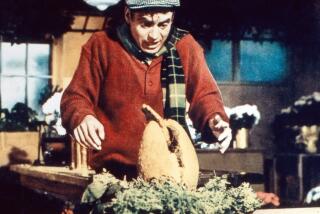Howard’s Embrace of Camera, Good Life
- Share via
John Mills, paying tribute to his fellow actor Trevor Howard, who died Thursday at the age of 71, said he was an English Spencer Tracy. An actor could hardly ask for a more flattering and in Howard’s case more fitting description.
Like Tracy, Howard conveyed such a bone-deep honesty that the character was totally revealed and the artist’s craft totally concealed. Also like Tracy, Howard had trained for the stage and commenced his career on it. But once he had found the camera, and vice versa, the movies became his metier.
He was one of a generation of potent and commanding British actors (although in truth the generation sometimes seems to have neither a beginning nor an end).
His near-contemporaries have included Lord Olivier of Brighton, Sir John Gielgud, Sir Michael Redgrave, Sir Ralph Richardson, Sir Noel Coward, Sir John Mills himself and the slightly junior Sir Richard Attenborough. Knighthood eluded Howard, as it did Richard Burton and as it has Peter O’Toole.
Why he should have remained undubbed by the Queen’s sword is not certain. Possibly his boisterous and occasionally brawling embrace of the good life was a factor. Possibly his concentration on film acting rather than stage acting was a factor. (Attenborough was knighted for his public services as well as for his film making and acting.)
There is a lingering feeling in the West End that film acting is what one does in the spaces between stage work, or when the Inland Revenue is breathing heavily down one’s neck and money is a problem.
Howard made some films that earn no stars in the guidebooks and will probably not appear on anyone’s list of the 100 best films of the century. But it is impossible to remember an appearance of his that was not solid, commanding and highly watchable, whatever the prevailing mode of the piece.
The characters he played were not always likable. His Captain Bligh was not half as flamboyant as Charles Laughton’s but what it lost in theatricality it gained in menace and believability. He did the martinet very nicely.
Yet, as Spencer Tracy could and did, Howard portrayed to a kind of perfection the contemporary middle-class man, who is fundamentally decent but possibly hard-used and in a jam, the unheroic figure who can rise to heroism, the man-in-place who retains a touch of humanity as he keeps the world moving.
“Brief Encounter” was a fragile piece of material. Today a script about a pair of would-be adulterers inhibited by the force of their consciences (as well as by the circumstance of a disapproving society) would likely not get past the first reader.
But Howard and Celia Johnson made both their love and their anguish so real that David Lean’s film (in glorious black-and-white) of the Noel Coward one-act play became an instant classic, to be seen now for its nostalgic value in every sense.
In “The Third Man,” Howard was again the decent man, the norm against which to measure the villainies of Harry Lime, the power of good to erase Orson Welles as a force of evil (the world of cinema was then still insisting that good wins in the end).
Unlike Tracy, he was from early times a star supporting player more often than the leading man. That was evidently agreeable; Howard saw acting as a job of work to be done honestly and well but not necessarily to be equated with biblical prophecy in importance.
It may be that a more ambitious and undistracted pursuit of stardom would have enlarged his career and even extended his life (although 71 years in high gear is not a bad run).
Yet Howard’s restless celebrations raise a question larger than himself. It is whether acting, even if superbly done, is finally sufficient for the actor, or whether it leaves unexpended stores of creative energy. The contented actor is as rare as the self-effacing actor, although there are many of both.
Actors go to writing, directing, producing, civic duties and charitable good works in quest of supplementary psychic income. They also go to good times and boon companions.
The lingering thought is that a legacy of great performances, such as Trevor Howard’s, may have been achieved at a higher cost than we might have guessed, gazing with pleasure and admiration at the silver screen.
More to Read
Only good movies
Get the Indie Focus newsletter, Mark Olsen's weekly guide to the world of cinema.
You may occasionally receive promotional content from the Los Angeles Times.






